
40 minute read
Beckley Dinner
A Night of Inspiration
CU FOUNDATION WELCOMES J.R. MARTINEZ TO THIS YEAR’S BECKLEY DINNER
Advertisement
Aburn survivor, Army veteran, actor, New York Times best-selling author, and winner of Dancing with the Stars is this year’s Concord University Foundation Beckley Dinner keynote speaker—you do not want to miss the opportunity to hear J.R. Martinez’s story of triumph over adversity.
J.R. Martinez has traveled the world speaking with troops, as well as non-profits, universities, and a number of Fortune 500 companies—Wells Fargo, General Motors, and Red Cross, to name a few. Concord University is proud to be among his virtual stops this year, and we know his message will inspire you.
A desire to inspire others began long before his book Full of Heart: My Story of Survival, Strength and Spirit hit the best sellers list, before his 2011 victory on ABC’s Dancing with the Stars, and before his three year full-time acting career playing a veteran on the television show All My Children.
J.R. Martinez gave his first inspirational talk in a recovery ward to a fellow burn patient. Nearly a year after he enlisted in the United States Army, this 11-B Infantryman from Hope, Arkansas was on a routine patrol in Iraq when the Humvee he was driving hit a roadside bomb. Three other soldiers in the vehicle were ejected, leaving Martinez trapped. But he survived.
Martinez underwent 34 different surgeries and multiple skin grafts over the next few years, and it was during his time in the hospital recovering that a nurse asked him to speak to another burn patient who had just seen his body for the first time. “After a brief visit with the young man, I realized I had made a positive impact and helped him in some way,” Martinez writes on his website. He continued to help other wounded survivors in the weeks that followed that first visit, learning that “inspiration is often a two-way street.”
Martinez continued to travel the world as a motivational speaker, sharing his story with others. He says that while his story may be unique, his message is universal: “Change isn’t bad if you are willing to adapt.” He is passionate about giving back, dedicating much of his time to the non-profit world. He is a spokesperson for Phoenix Society for Burn Survivors, Glasswing International, No Barriers, and Debra of America.
In 2008, All My Children was holding an open casting call, looking for a veteran to join their cast. Encouraged by a friend, Martinez auditioned and got the part. What was
CONCORD UNIVERSITY FOUNDATION, INC.
initially slated as a three month stent turned into three years on the show.
In 2011, Martinez was asked to join Dancing With the Stars, partnering up with Karina Smirnoff. Their moves won the mirror ball trophy, naming the duo season 13 champions. After the show, he was asked to serve as Grand Marshal of the 2012 Rose Bowl Parade.
Taking a break from the spotlight, Martinez started writing his first book. Full of Heart: My Story of Survival, Strength and Spirit was released in 2012 and quickly climbed onto the New York Times Bestsellers list. “My book allowed me to connect with the world and proved that being vulnerable in front of others is respected,” he writes.
Martinez lives in Austin, Texas with his wife, Diana, and their daughter, Lauryn Anabelle. You can’t catch him on the television screen right now because he spends most of his time traveling, speaking, attending events, and enjoying quality time with friends and family. You can, however, hear his remarkable story told as only he can, streaming live at the Beckley Dinner on November 5.
While pandemic circumstances have changed (and may continue to change) how the Beckley Dinner will look this year, technology will stream Martinez live for our donors. A plated and socially distanced dinner will be served in the Bright Ballroom at Glade Springs Resort on November 5 at 7:00 pm, and Martinez will join us live via Zoom immediately following your meal. The proceeds from this event contribute to the Foundation’s annual fund, which supports student scholarships and campus improvement projects.
The student need right now is perhaps greater than it has ever been, and by purchasing your ticket to the Beckley Dinner, you are helping Concord students fund their education. In return, we are honored to bring you the inspirational story of J.R. Martinez. This is an opportunity you do not want to miss.
To purchase your tickets to this and other Concord University Foundation events, visit our website at www.concord.edu/beckleydinner.

Blake Farmer, Manager of University Advancement
September 24, 11am - September 25, 11am Help us reach our 2020 goal of $50,000 in 24 hours to benefit the CU Annual Fund. Visit concord.edu/dayofgiving for additional information.
RISTORANTE ABRUZZI • CHARLESTON, WV
ADVENTURES ON THE GORGE • FAYETTEVILLE, WV
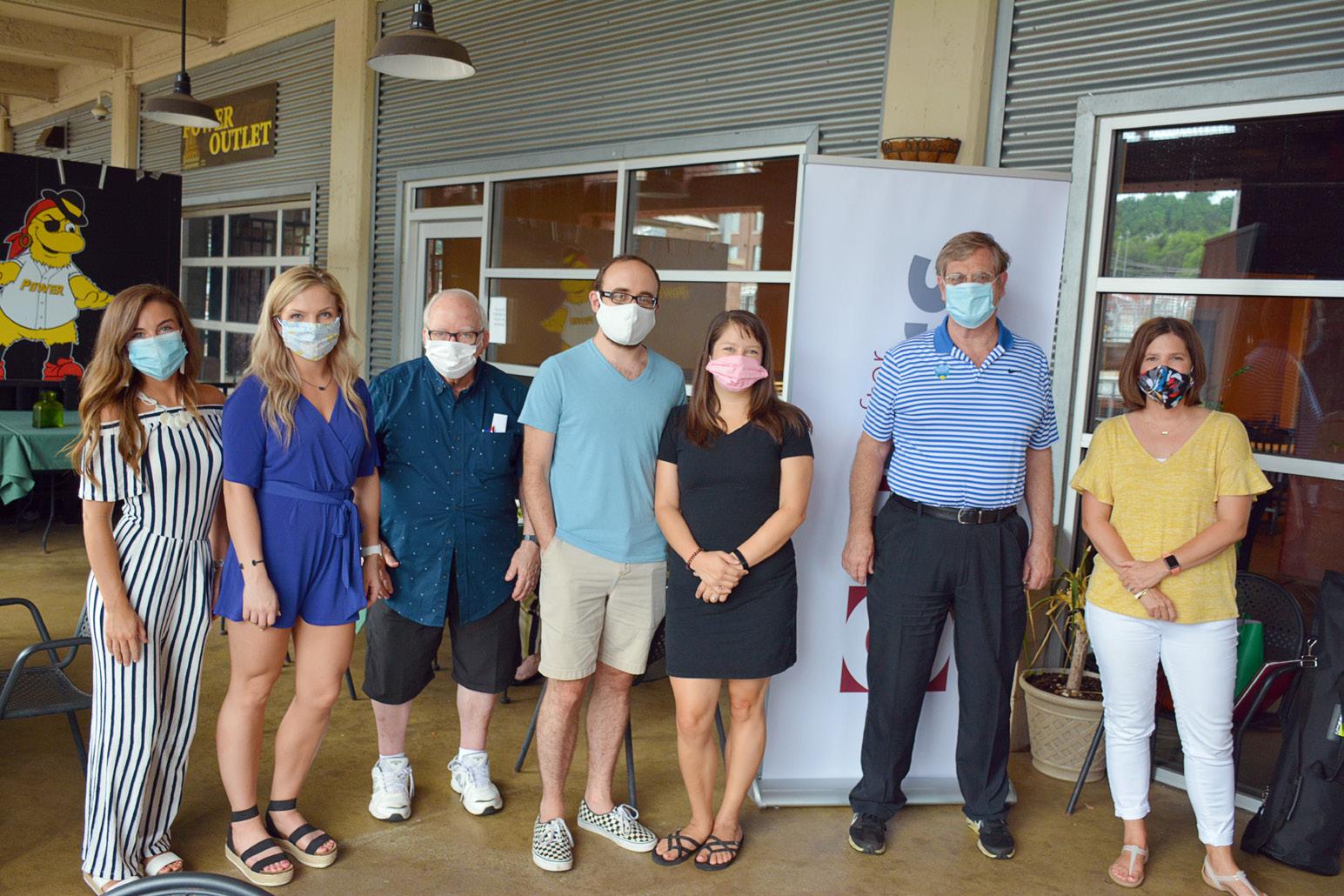
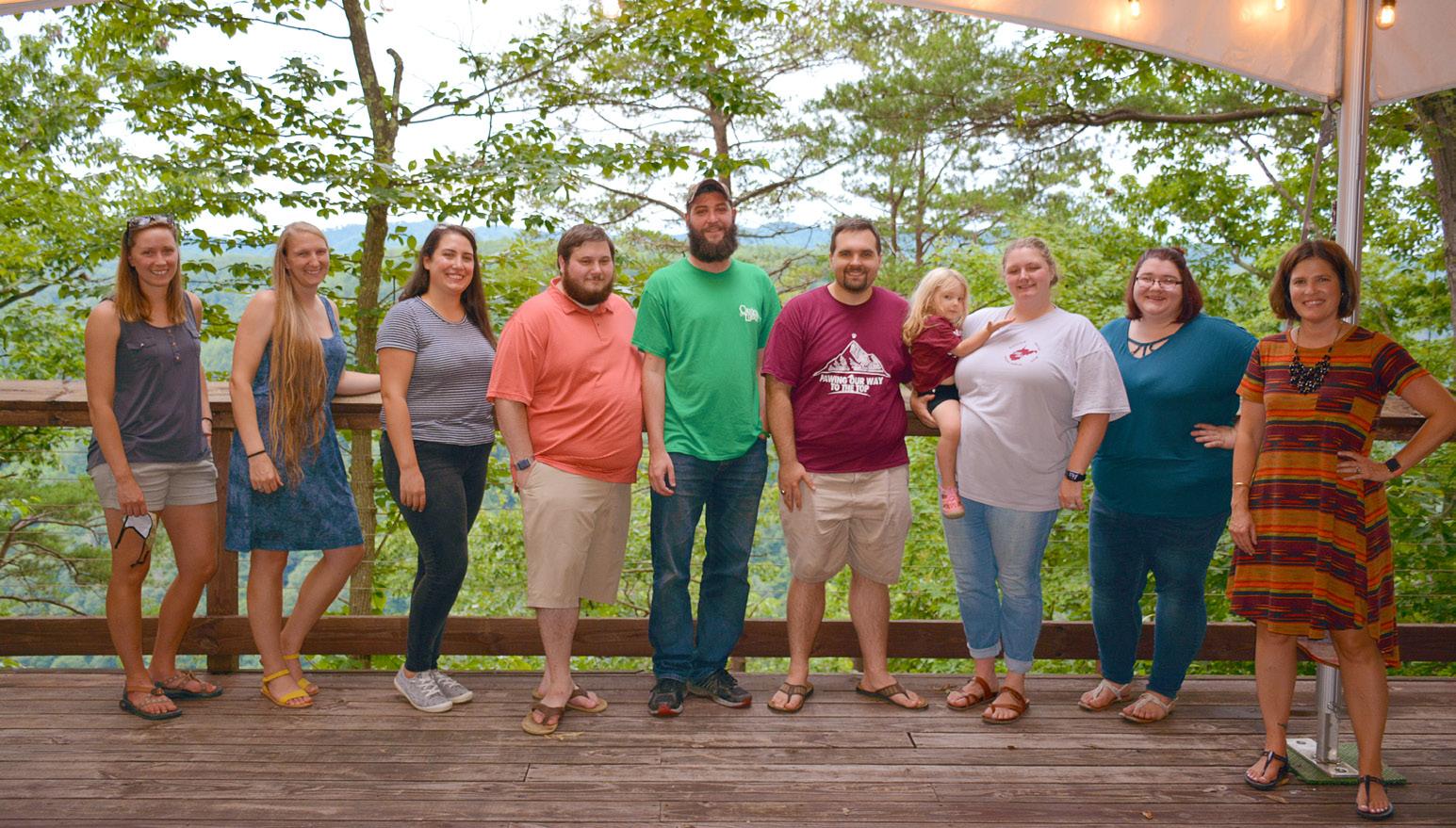
In late July, the Advancement Office hosted a CU After Hours event at Ristorante Abruzzi in Charleston, West Virginia. A handful of alums came out of quarantine for an evening of food and appropriately "social distanced" conversation. Pictured L to R are: Ellie Thomas '20, Chelsea Goins '19, Victor Grigoraci '64, Joe Carowick '15, Brittany Means Carowick '12, Ed Bailey '75 and Sarah Lively Turner '98.
Alums from the Fayetteville area gathered at Adventures on the Gorge on August 13 for another CU After Hours event. Pictured from left to right are: Casey Ord '13, Kate Armentrout '12, Megan Maynor '16, Patrick Erickson '17, JR Davis '12, Jordan '17 and Mikaela Adkins '17 and their daughter Emmy, Amanda Erickson '18 and Sarah Turner '98.

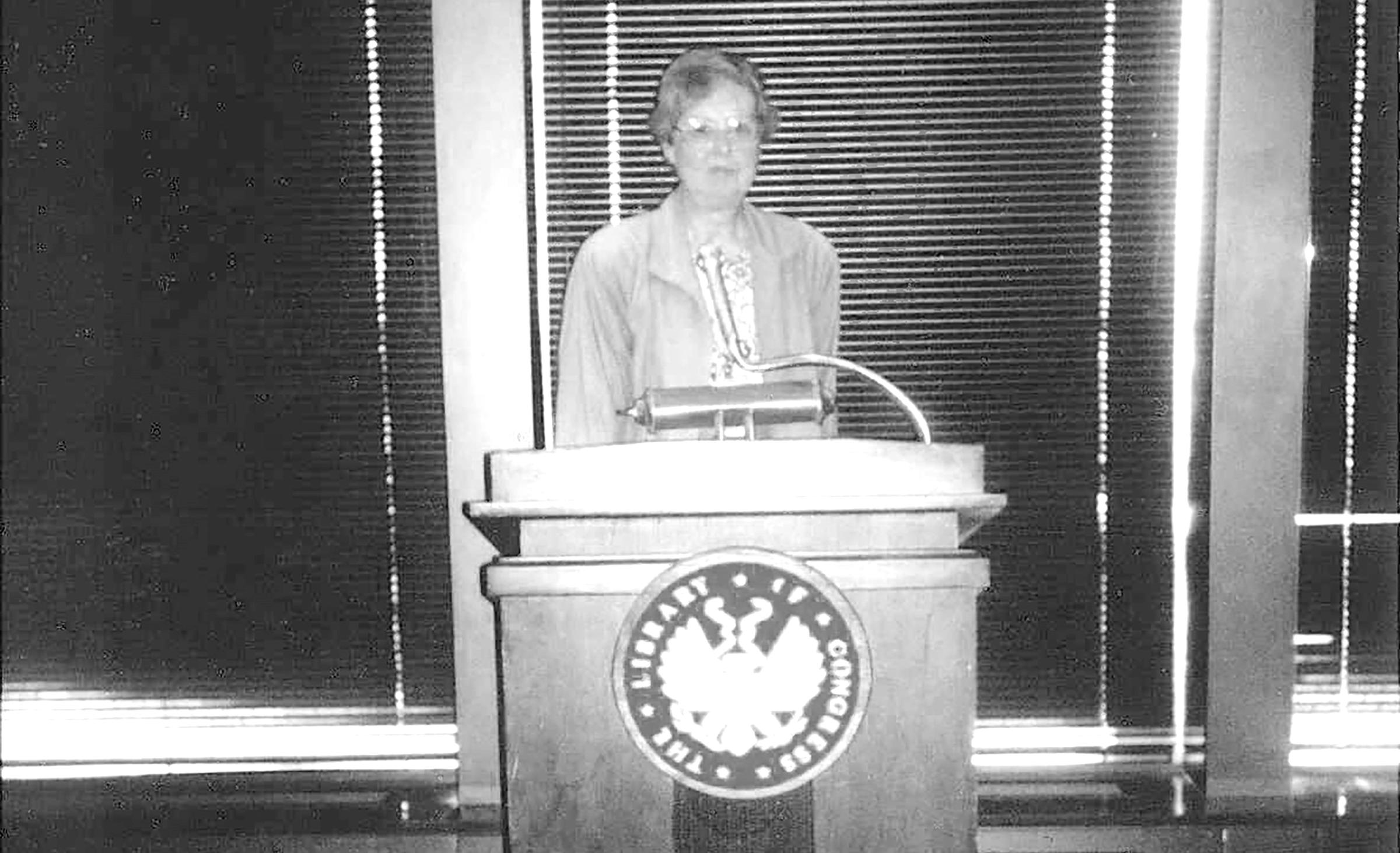
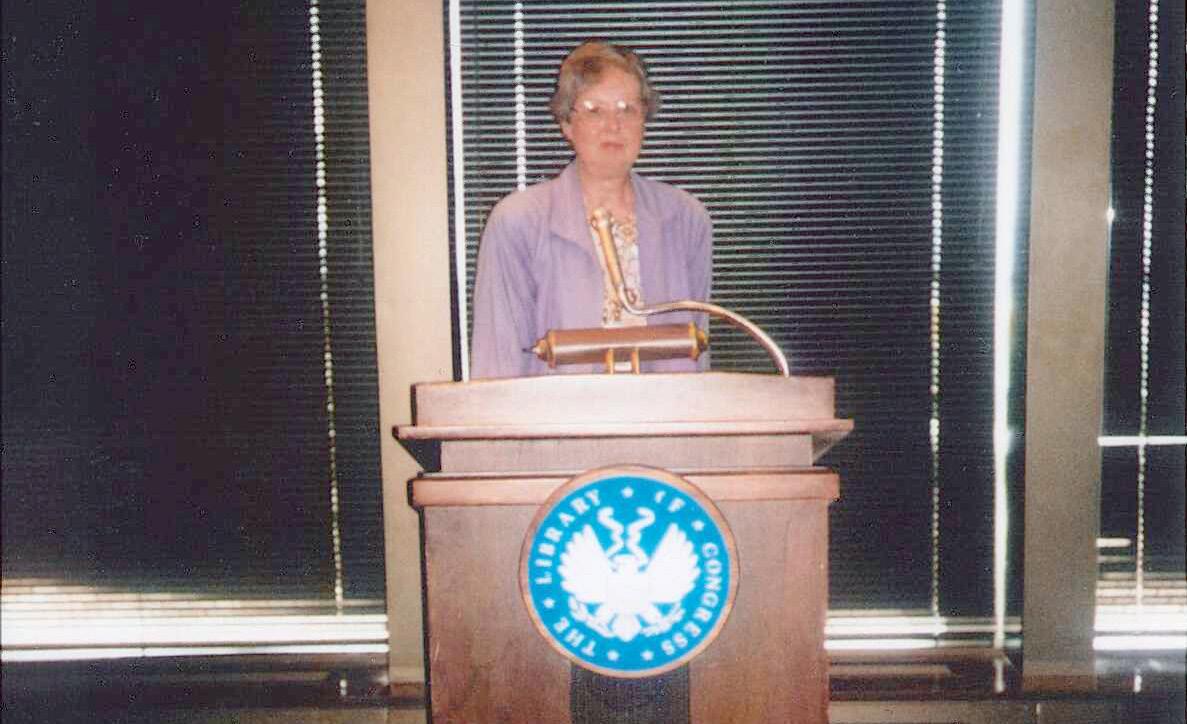
Nancy offers remarks upon her retirement from the Library of Congress in 1999.
NANCY JACKSON ’65 FINDS HER NICHE AT THE LIBRARY OF CONGRESS
Nancy Jackson’s rewarding career with the Library of Congress spanned more than three decades.
This wasn’t her first job amongst the books and card catalogues, however. When she was a student at Concord, she worked in the Marsh Library. She recalls that she worked 10 hours a week, making 50 cents an hour.
Her pay improved when she took on another student employment position.
“In the last semester of my senior year, I got a job grading English papers for $1.00 an hour!” she reports.
While Nancy spent part of her youth in West Virginia, she is a native Hoosier.
“I was born in Fort Wayne, Ind.,” she explains. “Sometime in the early 1930s, my father and some other men from Organ Cave, W.Va. went to Fort Wayne to work at International Harvester. Prior to that, he had met my mother at a camp meeting in Renick, W.Va. They married in 1937. In 1947, following the end of World War II, we moved back to West Virginia and lived on a series of farms in Organ Cave, Sinks Grove, and Renick.” »
Nancy Jackson ’65
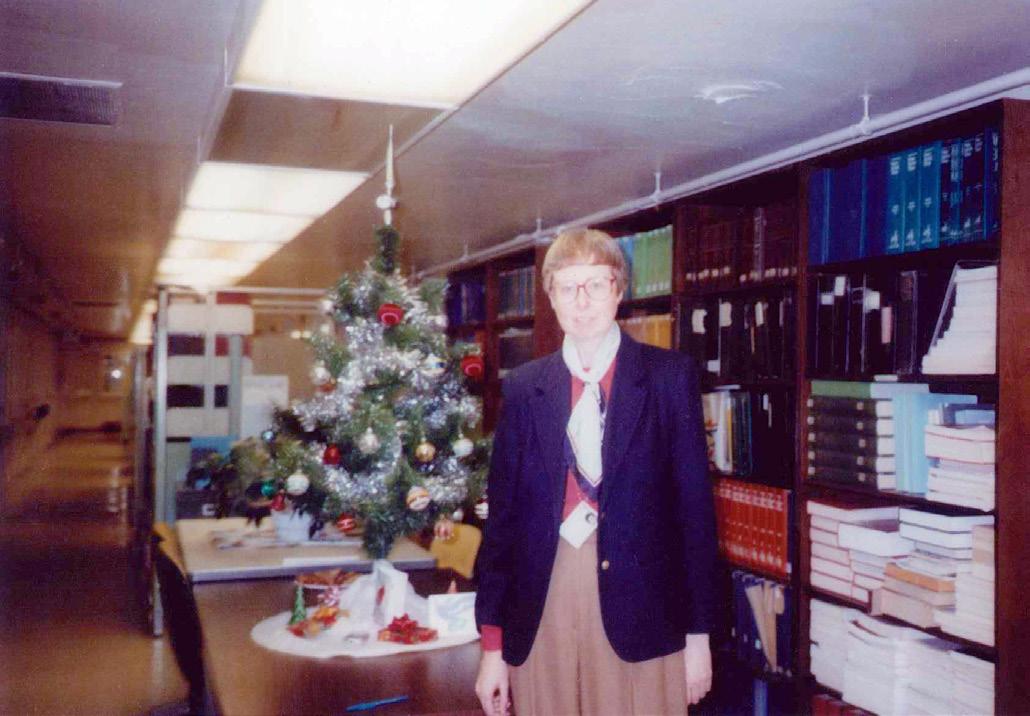
On the job at the LOC.
Nancy says that she and her family made a wise decision when they selected nearby Concord for her college education.
“It turned out to be a good choice,” she says. “I loved the campus, still as beautiful now as then.”
Nancy majored in English. “I started out with a minor in library science, switched to sociology in the middle of my junior year and changed to a B.A. rather than a teaching degree,” she says.
Explaining how she has utilized her English degree, Nancy says, “At various times I did one-on-one teaching, some group teaching, written and oral communications. Studying English helped me with thinking analytically, organizing ideas, and communicating them clearly.”
Nancy also values the relationships she developed with Concord professors.
“I was able to have close contacts with some faculty: Russell Falt (piano and organ teacher), Arthur Flandreau (librarian), Mary Sewell Helvey (former librarian), and above all, Dr. James B. Shrewsbury, Jr., my mentor and lifelong friend until the 1990s,” she says.
Her favorite classes included “virtually all of my English courses, especially Dr. Shrewsbury’s Victorian Period and Advanced Composition and Dr. William Robertson’s Shakespearean Tragedies.” “We spent half the semester studying ‘Macbeth’. Even now, I know quite a bit of it by heart,” she says.
Dr. William Ofsa’s course in History of the English Language was also a memorable class. “I think about it as I hear the language changing,” she muses.
Nancy was assistant editor of the yearbook and a hall monitor in her dorms. She was a member of Cardinal Key and Alpha Beta Alpha, and named to Who’s Who in American Colleges and Universities in 1965. She and her friends enjoyed going to Princeton for hamburgers and movies, “socializing in the dormitories”

Nancy celebrates her May 1965 graduation as the class valedictorian with mentor, Dr. James B. Shrewsbury.
and snacking on popcorn on Saturday nights when their house mother “suspended her rules about popcorn poppers.”
Nancy’s academic achievements led her to the top of the Class of 1965, and she had the honor of serving as the valedictorian.
Nancy has a special family tie to her alma mater. “My paternal grandmother, Nancy White Jackson, died when I was two so I never knew her. I feel a connection in that she attended Concord Normal School,” Nancy explains. “She was said to have a beautiful singing voice, so perhaps I inherited some of my interest in music from her.”
Nancy recently donated some of her grandmother’s memorabilia to the Marsh Library.
After graduating from Concord, Nancy earned a Master of Science in Library Science from the University of North Carolina at Chapel Hill in 1967. Calling on what she learned in Concord classes, she bypassed several hours of coursework.
“At the library school I passed equivalency exams in cataloging and classification and book selection using the knowledge from Concord library science classes,” she explained.
While she was at UNC, she participated in an assistantship with the graduate library school, worked 20 hours a week in the art library, and was elected to Beta Phi Mu on the basis of academic performance. “Concord prepared me to hold my own in graduate school in competition with students who had gone to far better known schools,” she said.
Nancy continued her education by earning an M.A. in English from George Washington University in 1973. She cultivated her talents as a classical pianist by studying piano with composer and GW professor, Robert Parris, for 16 years.
“More recently, I have attended a program for amateur pianists, Piano at Peabody, at the Peabody Conservatory in Baltimore, Md.,” she said. She has participated in this musical program for 10 years.
Nancy had several exciting employment options after »
completing her master’s degree at UNC.
“In 1967 there were more library jobs available than people to fill them,” she explained. “We had recruiters from all the New York City libraries, Harvard, a corporate library among others – and the Library of Congress.”
After accepting a position with the Library of Congress, Nancy moved to Washington, D.C. and in July 1967, embarked on a 30-year adventure of living and working in the nation’s capital.
“I was a descriptive cataloger and later a supervisory librarian in three different divisions,” she explains. “Besides the work, I enjoyed the diverse staff from various parts of the world, and above all, for once in my life, having access to all the books I wanted to read. This was not always the case during my childhood,” she said.
“I enjoyed all that Washington, D.C. has to offer: concerts, museums, plays,” she continued.
“I discovered travelling and have travelled in the U.S., Canada, and Europe.” “I liked to travel to places where I had literary associations. I loved my first trip to England in 1978. In 1979, I spent two days in Concord, Mass., and went to all the transcendentalist sites, especially Walden Pond,” she said.
Nancy also took advantage of educational programs offered to library staff.
“Librarians seem to have interests in a wide variety of subjects and activities. We had lunchtime programs
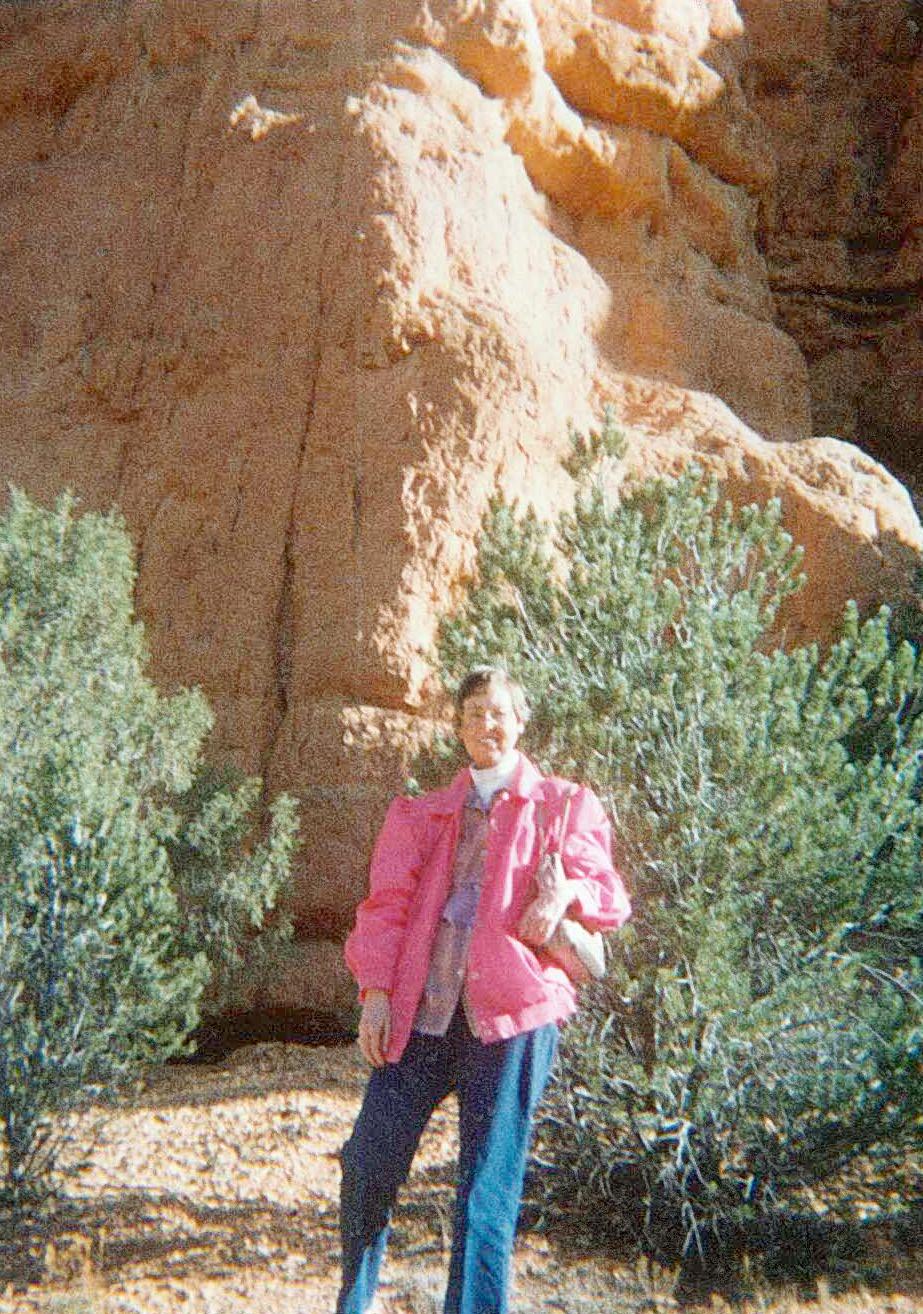
An avid traveler, Nancy counts the American Southwest among her destinations.
on diverse topics: cooking, music, stamp collecting … the list goes on and on. Sometimes we had speakers. I especially remember Jorge Luis Borges and James Brady,” she recalls.
“People often comment that ‘the Library of Congress must have been an interesting place to work.’ It was, but it is necessary to remember it is a very large organization with approximately 4000 employees when I was there,” she explains. “Working there, one works in one’s particular niche. Mine was descriptive cataloging.
“At LC, various functions of cataloging that might be done by one or a few people in a smaller library were done in successive stages by different staff members. My work had to do with the bibliographical portion of the cataloging record,” she said.
“I worked in three divisions as a cataloger, quality control specialist, and supervisor in three divisions: Descriptive Cataloging Division, National Union Catalog Division, and Cataloging in Publication Division. All positions used my knowledge of descriptive cataloging and cataloging in general,” she continued.
Nancy retired from her job at the Library of Congress in July 1999. “I have enjoyed life in the ‘slow lane’ ever since,” she said.
Nancy currently lives at Greenspring Village, a retirement community located in Springfield, Va. “It has a lovely setting in the middle of woods. Prior to moving here, I lived first in D.C., then in Arlington, then Alexandria when I bought a condo,” she says.
She enjoys tending her two garden plots and playing the piano, offering the occasional performance. As an avid reader, her love of books remains strong.
Reflecting on her life, Nancy says, “Someone said that getting older is like climbing a mountain. The views keep changing as you go higher. Looking back, I greatly appreciate the occupational, educational and cultural opportunities that I had. They exceeded my childhood dreams.”

FUELING THE
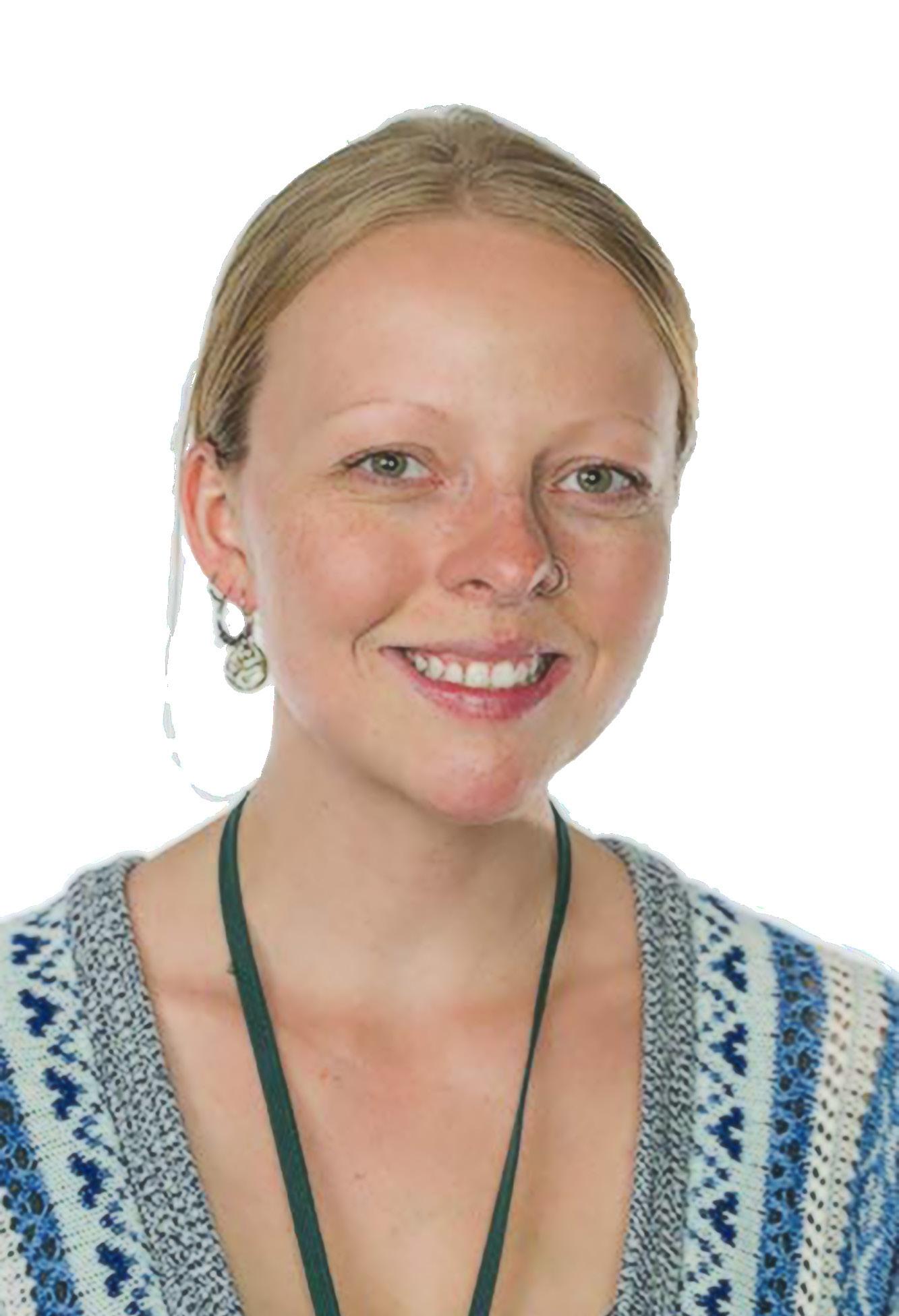

FUELING THE FUTURE
SCIENTIST LIZ WARE ’09 IS DEDICATED TO RESEARCHING RENEWABLE ENERGY

As a scientist in the field of renewable energy, Dr. Anne Elizabeth Ware is gaining recognition for her professional contributions. She currently works for the National Renewable Energy Laboratory in Golden, Colo., where she is a researcher and task lead for the high-throughput biomass analysis pipeline for the Center for BioEnergy Innovation (CBI).
For her efforts, she has received multiple honors including the Director’s and President’s awards and recognition as a Key Contributor. Along with her colleagues she is recipient of the 2019 Alliance for Sustainable Energy Chairman’s Team Award for Exceptional Performance in analyzing numerous samples on the high-throughput pipeline she leads.
According to its website, the National Renewable Energy Laboratory (NREL) is “a leader in the U.S. Department of Energy’s effort to secure an environmentally and economically sustainable energy future” and “the primary laboratory for research, development, and deployment of renewable energy technologies in the United States.”
Dr. Ware explains the nature of her work with NREL.
“I study what plants are made of and how we can use them to make fuels, chemicals and materials,” she said. “I also try to find the best ways to accurately and quickly analyze the products we convert the plants into.
“Most of my work involves mass spectrometry and pyrolysis which basically means I burn plants in low oxygen environments and study the mass of the molecules that are made, which tells me a little about the plants themselves while the ‘burning’ is also a way to produce chemicals from plants that we might be able to use for something like fuel or polymers,” she continued.
Dr. Ware began her career with NREL as a postdoctoral researcher in January 2014. She advanced to her current position in January 2016.
Liz Ware graduated with honors from Concord in May 2009, receiving a Bachelor of Science degree in Comprehensive Chemistry. She minored in Mathematics.
Her decision to attend Concord was based on the university’s reputation and its proximity to her hometown, Bluefield, W.Va.
“I heard it was a good school and it was small and close to home,” she said. “I wanted to go to a school with small class sizes so I could get meaningful interactions with my professors. I think it paid off because I was pretty well prepared for »
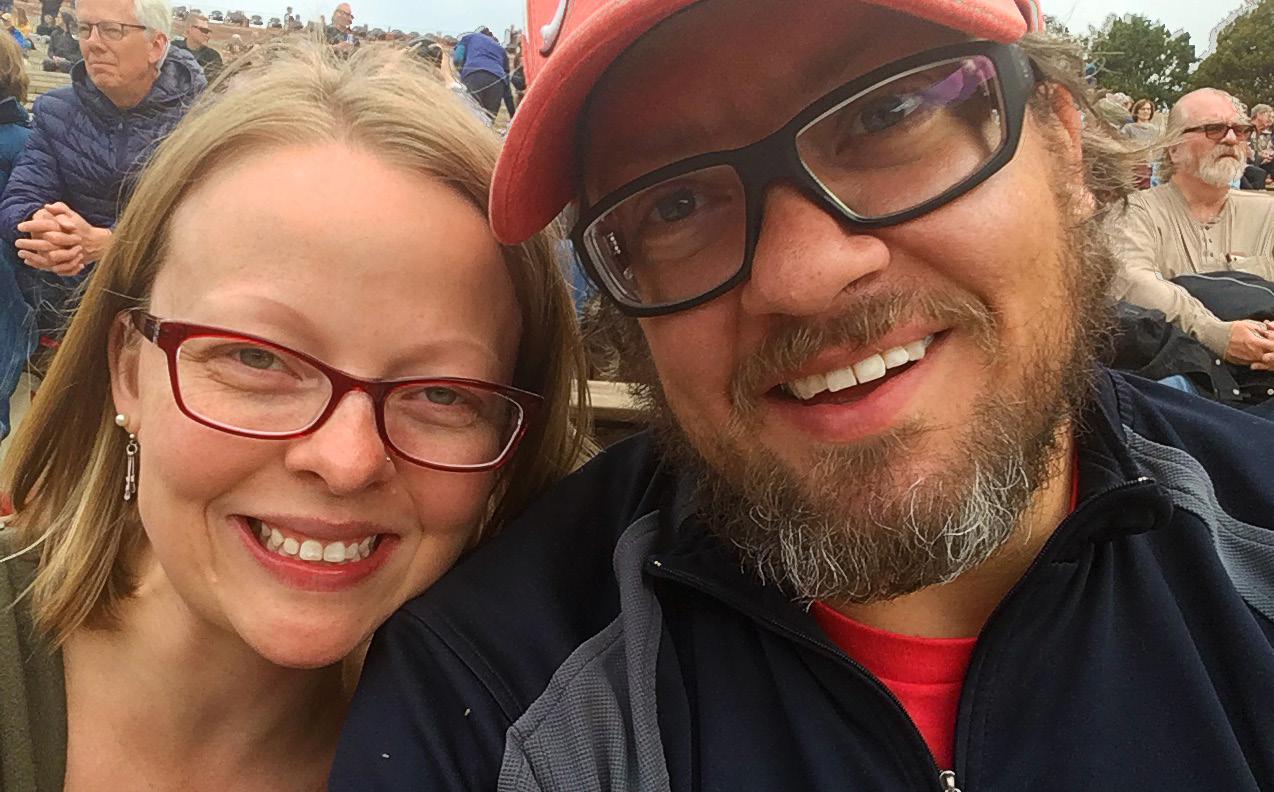
Liz and Ian


Liz and Ian reach the summit of Mount Bierstadt at 14,065 ft. graduate school.”
Reminiscing about favorite classes and professors, she says, “I liked all of my classes taught by Dr. Crick, Mr. Westerik, Dr. Winfrey, Dr. Krider, Dr. Hawthorne-Allen, Dr. Brichford and Dr. Baker.”
She considers the time she spent with fellow science students among her best Concord memories.
“I loved hanging out with other students in the science lounge outside of Dr. Crick and Dr. Allen’s offices,” she said. “We would study and do homework and goof off and bother professors there.”
Her campus involvement included tutoring, participating in Upward Bound, and helping organize Concord’s student affiliate of the American Chemical Society.
Excelling academically, Liz received a number of scholarships and honors at Concord. Among these are West Virginia Promise Scholarship, Concord University SAT Scholarship, Academic Achievement Scholarship, Students of Excellence Scholarship, A.H. Montgomery Chemistry Prize (Chemistry Graduate Highest Honor), and the Virginia Blue Ridge Section of the American Chemical Society James Lewis Howe Award.
Liz has strong family ties to Concord. Her late grandmother, Belvia Reid Honaker, earned her degree at Concord and went on to teach for several decades in Mercer County (W.Va.) schools. Mrs. Honaker, along with Liz’s sister, Mary (Harman) Parks, belonged to Sigma Sigma Sigma. Mary and her husband, Joey Parks, both graduated from CU.
Liz met her husband, Ian Ware, at Concord. Like Liz, he is a member of the class of 2009. He earned a Bachelor of Science degree in Geology. Liz and Ian have two children: A son, Tristan, who is 5 and daughter, Rory, 3.
After living in Arvada, Colo., the Wares will be making their home in Golden. Joey and Mary are also currently living in the “Centennial State”.
Following Concord, Liz furthered her education at the University of Kentucky where she earned a Ph.D. in Chemistry in December 2013. While she was at the Lexington, Ky. school, she received first and second place awards in poster competitions and was honored with a Max Steckler Fellowship and the Chemistry Department’s Outstanding Graduate Student Research



Award. She also served as a graduate student research assistant, a teaching assistant, and a laboratory technician.
Liz describes how her Concord degree served her well in graduate school and now professionally. “I’m a scientist so it is my absolute foundation,” she explains.
She says that attaining her doctorate “wouldn’t have been possible if not for Concord.”
“Also, my career as a scientist that works in a very cross disciplinary field – I work with chemists, biologists, engineers, ecologists, horticulturists, etc. – was well founded by all the different types of science classes I took at Concord including geography, geology, biology, physics and math,” she says. “I also benefited from the English department since writing wasn’t my strong suit and the professors »
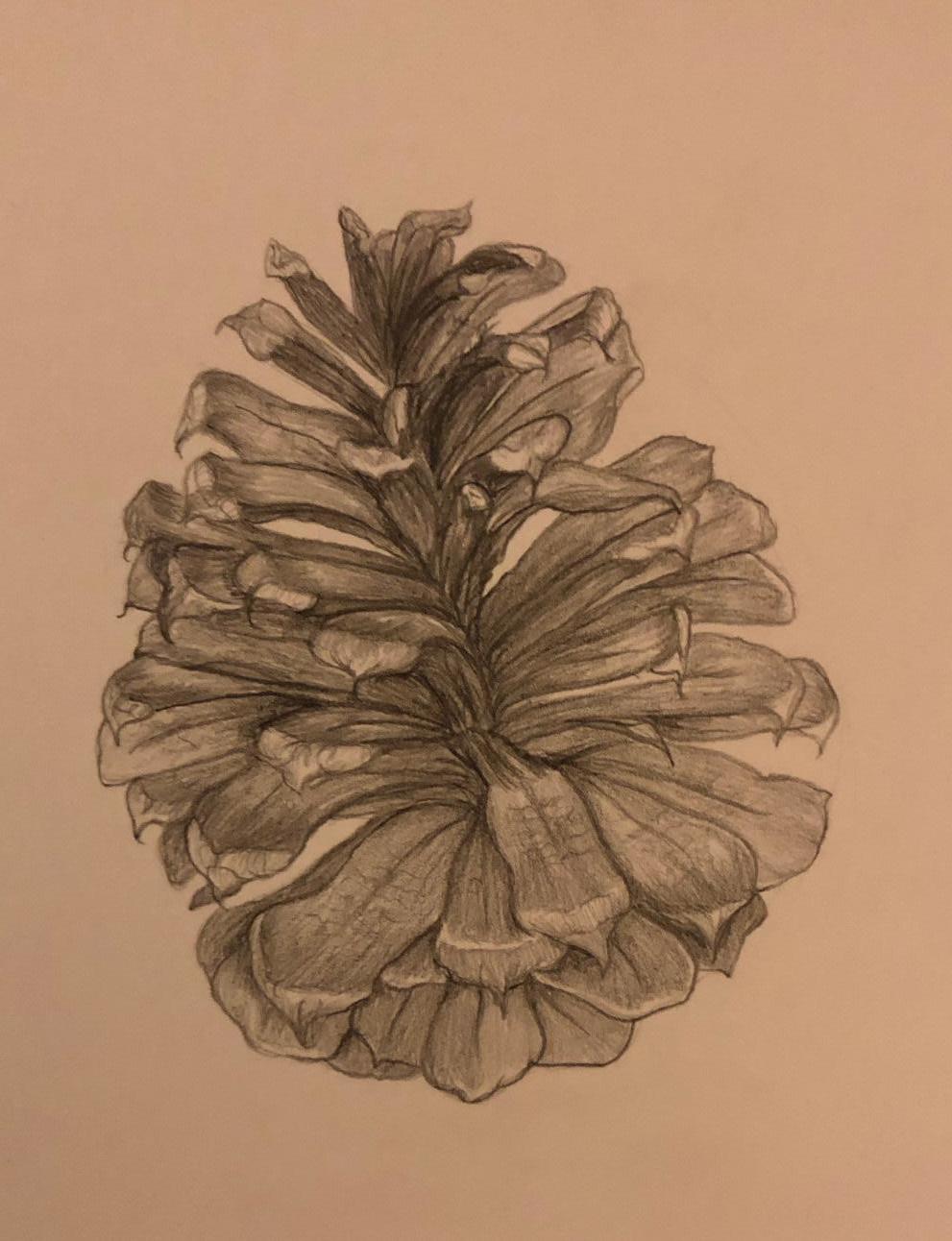


helped me improve my reading and writing skills which I need and use for publishing scientific papers.”
Along with earning her doctorate and doing postdoctoral work at NREL, Liz considers her current role in task leadership with the laboratory – and the accolades this has brought – her top professional accomplishments to date and the highlights of her career.
Additionally, she says, “I’ve helped develop a lot of analytical methods that people use to analyze plants and biofuels and contributed towards some work that helps to understand plant genetics.”
She counts “collaborating with people from all over the country” among the rewards of her career.
“I get to work with so many amazing scientists,” she said. “I get to do lab work, field work and sometimes I just enjoy sitting back and writing it all up to share with others.
“Also, I’m an analytical chemist and it’s very rewarding to analyze something for someone and give them answers that help solve problems or better understand something or inspire us to ask more questions,” she continued.
She also finds fulfillment in her career by presenting at national conferences and publishing her work in scientific journals.
Dr. Ware has been involved in outreach and community service in various ways throughout her education and professional work. At the University of Kentucky, she conducted demonstrations for public schools on behalf of the Chemistry Department and served as a judge for a local
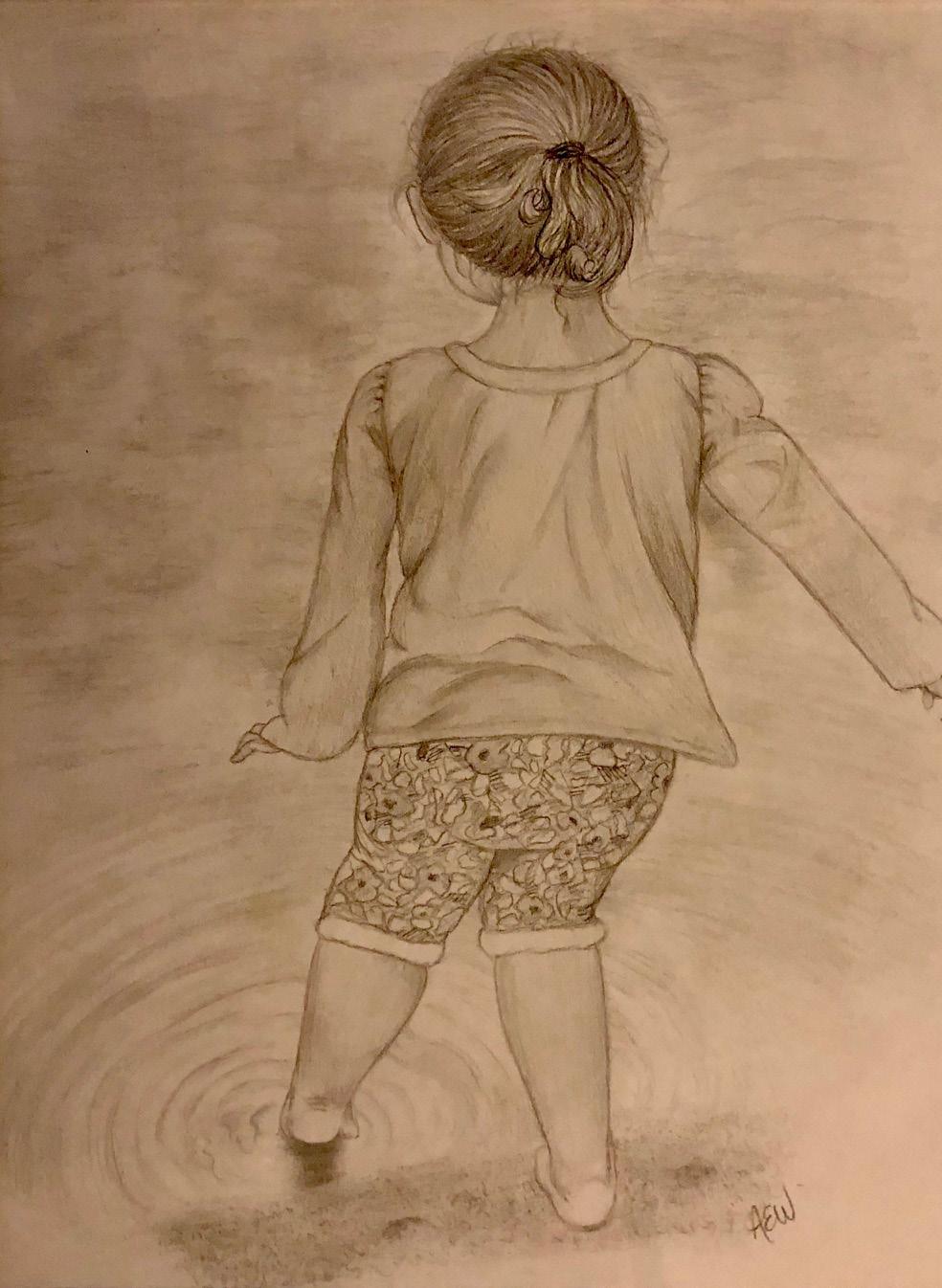

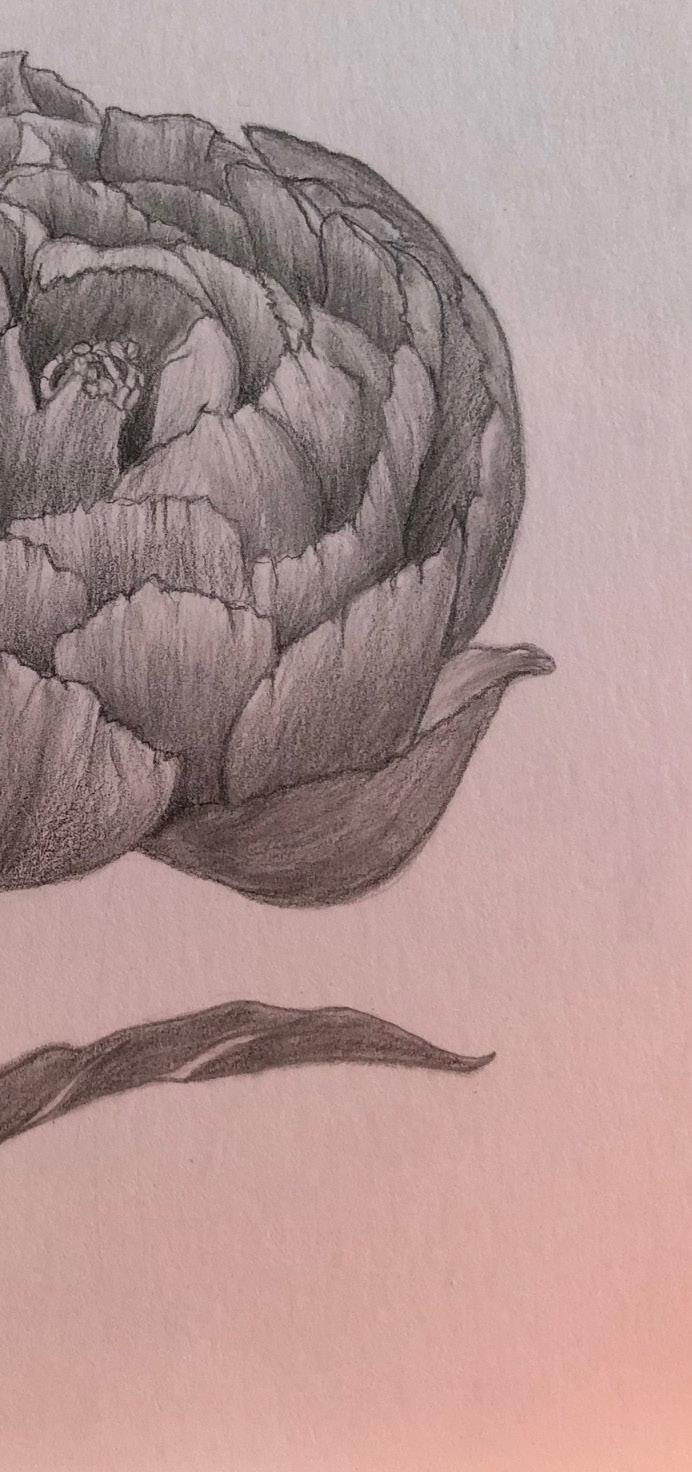
Liz’s pencil sketches often include subjects from nature.
elementary school’s science fair. She mentored high school students who worked on senior projects in the laboratory and tutored undergraduate students in introductory and advanced chemistry classes.
Her involvement has continued in Colorado. “I volunteer for lots of educational outreach activities within NREL, particularly the state science bowl every year,” she explains.
She is also a mentor for undergraduate interns; a member of the American Chemical Society; and a participant with the Postdoc Committee as a panel member and mentor.
Surrounded by the natural beauty and cultural opportunities of Colorado, Liz enjoys the lifestyle offered by living there. Outdoor activities including “lots of hiking” are on her list along with attending concerts.
“I also love going to the botanic gardens in Denver and the art museum and there’s good food here, too,” she says.
As for other hobbies and pastimes, Liz says she likes yoga and to draw, garden and cook. Her artistic talents lean toward pencil sketches of subjects found in nature. “I also consider cooking an art,” she says. She counts Japanese, Vietnamese, Thai, and Korean dishes among her culinary favorites.

Frank pauses on a hike in Glacier National Park, Montana, to take in the grandeur.


FRANK FOLEY ’02 UTILIZES BUSINESS SKILLS IN COMPANY LEADERSHIP ROLE

Frank Foley says that the core values of the company he helps lead are a good fit for him and an important highlight of working there.
A Regional Vice President for Fastenal, Mr. Foley has oversight of $300 million in annual revenue with his sales management responsibilities and in the area of finance management, oversight of $116 million in assets. His personnel management duties encompass 182 branch locations and 750-plus direct report employees.
“The highlight of my career is getting noticed for the hard work and personal sacrifices I made to help the company and fellow employees. Each time I am asked to help or receive a promotion it reinforces that finding my ‘company good fit’ is a constant highlight,” he says.
“I always get frustrated with the statistics about job hopping and it will take five to six jobs to find your career,” he continues. “I was fortunate to find a company that shares similar core values – innovation, teamwork, ambition, and integrity – promotes heavily from within, and values performance.”
“I could list promotions, awards, or other achievements I am proud of, but honestly the fact is that I am happy doing what I truly enjoy. I get to travel to new places and work with an amazing group of employees with similar goals,” he says.
“Fastenal is many things to many different customers: an expert consultant, a logistics company, a technology provider, and more generally, a distributor of wide-ranging industrial and construction products,” Frank explains. “These aspects of our service share a common foundation: great people, close to our customers.”
Frank is responsible for the Mountain West Region of the company that includes portions of nine states: Alaska, Colorado, Idaho, Montana, Nevada, Oregon, Utah, Washington, and Wyoming.
He says that being honored along with his region »
Jill hikes in Grand Teton National Park, Wyoming. Snowboarding trip at Jackson Hole, Wyoming. has been an especially meaningful experience for him.
“If I had to identify the most rewarding accomplishment while at Fastenal, it would be my region winning third place for the company for overall performance at our awards banquet last December,” he said. “At the time I had been working as a new Regional Vice President for just under two years. This accomplishment showed that I had succeeded at motivating a large group of people to have a common goal.”
Currently based in Salt Lake, Utah, Frank has relocated on numerous occasions during his progression upward with Fastenal.
“I have moved quite a few times for work: Ashland, Ky. to Springfield, Ohio to Columbus,
Enjoying a hike at Snowbird Resort, Utah
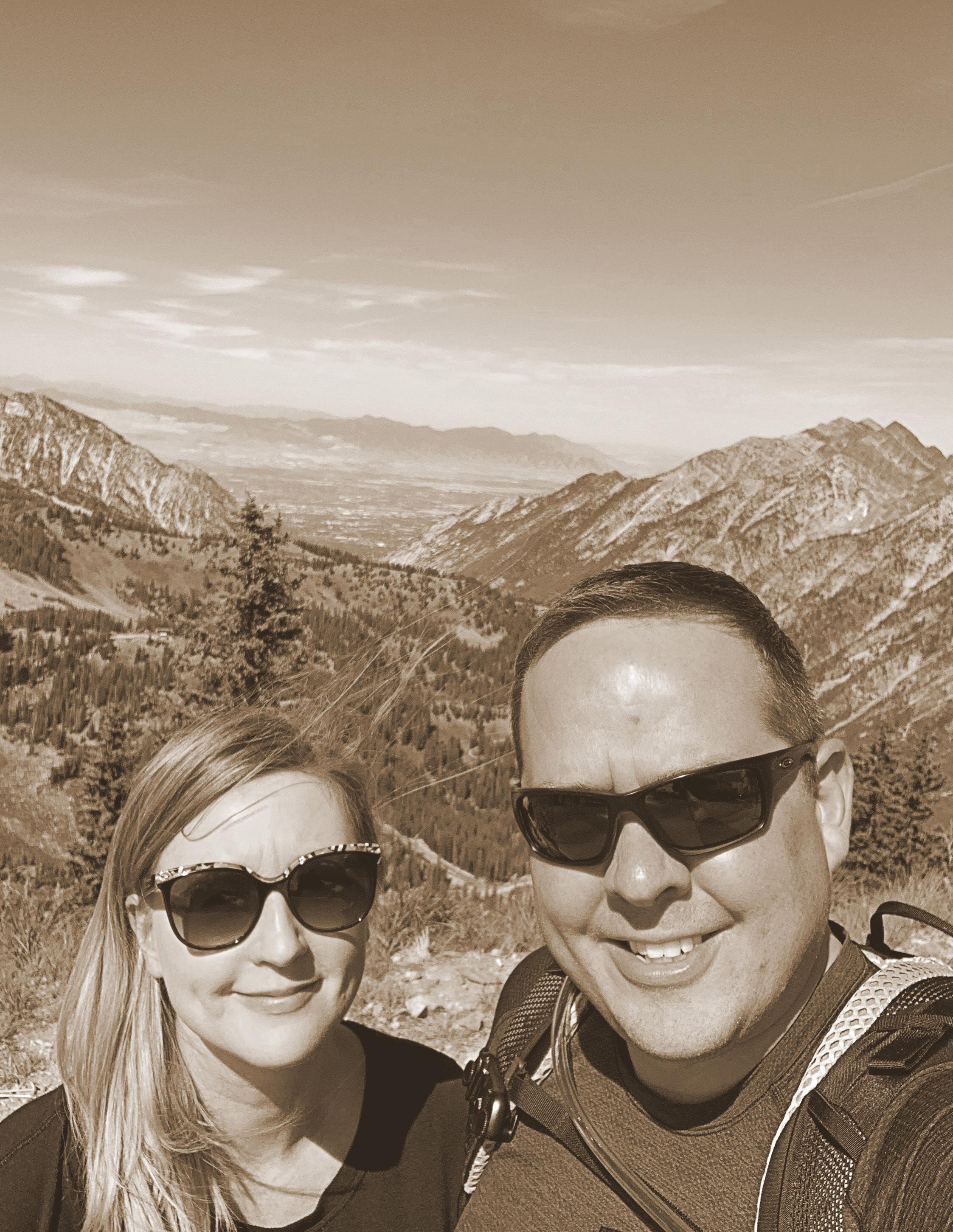
A snowboarding adventure in Aspen Snowmass, Colorado.

Ohio to Philadelphia to Cleveland and Akron, Ohio, then to South Jordan, Utah,” he says.
He has worked in outside sales, as a branch sales manager and district manager. He has been in his current position since August of 2017.
Frank considers his contributions in crafting a strong future for Fastenal and its employees his chief achievement thus far with the company.
“My top accomplishment is the opportunity to build a stable business foundation/ satisfaction for our future employees,” he says. “A lot of my time is spent on creating or investing in programs for the future. If we can invest some time, assets, or resources to make one of our locations more efficient, it has a compounding effect.
“Currently we are working on a standardization project for our vending machine programs. Our goal is to reduce the amount of time our employees spend servicing/ maintaining this program. Every hour we save helps the company, employees, and our customers (profit, work-life balance, reduced cost). This is the classic win-win scenario we often hear about and is amazing to experience firsthand,” he says.
When asked what he finds rewarding about his career with Fastenal, Frank says the company hits the mark for him in a variety of ways.
“I have found that I need to be challenged, rewarded for efforts/ performance, and work with great people while maintaining a healthy work-life balance,” he explains. “I have found a career that fits all of those criteria and more.”
Frank grew up in Williamsburg W.Va. Although he graduated from Concord with a bachelor’s degree in business management, business wasn’t his first choice for a major.
“As a freshman I enrolled as a biology major; however I realized that was not a great fit for me,” he said.
When friend and fellow student Lewis Dunbar suggested he consider business as a major, he followed through with the suggestion and switched majors during the spring semester of his junior year.
“I am so glad I did,” he says. “I quickly realized that business was a much better fit for my skill set.”
“After I changed my major to business, I was on the Dean’s List quite a few semesters,” he says.
Frank also received recognition for an internship he participated in as a CU student. “I also earned the Intern of the Year award at Enterprise Rent-A- Car for my management internship the summer of 2001,” he said.
When asked about his fondest memories from his Concord days, Frank replies, “anything involving meeting and proposing to my future wife Jill.”
“She is my rock,” he says. Jill graduated from Concord in 2001.
He adds that some of his best memories also revolve around his work in the residence hall.
“I had an opportunity to meet a number of great people while working at Wooddell Hall, ‘The WU’ ”, he said. “I worked the front desk with the work study program my freshman year. After getting to know the residence staff I was encouraged to apply for a resident assistant job. I was an RA my sophomore through senior years.
“The extra time spent on campus as an RA allowed me to meet and develop friendships with several different groups of students. Meeting the football players and international students was particularly fun,” he recalls.
Along with being an RA, Frank was also a member of Tau Kappa Epsilon fraternity.
Frank graduated from Concord in December 2002.
“Concord also provided me with an opportunity to attend a quality four-year institution of higher learning relatively close to home,” he said. “Having grown up with a single parent, college was a concept that sometimes seemed out of reach financially. Concord offered a quality education that was affordable and easy to navigate.”
Frank explains how his Concord degree is helping him in his career. »
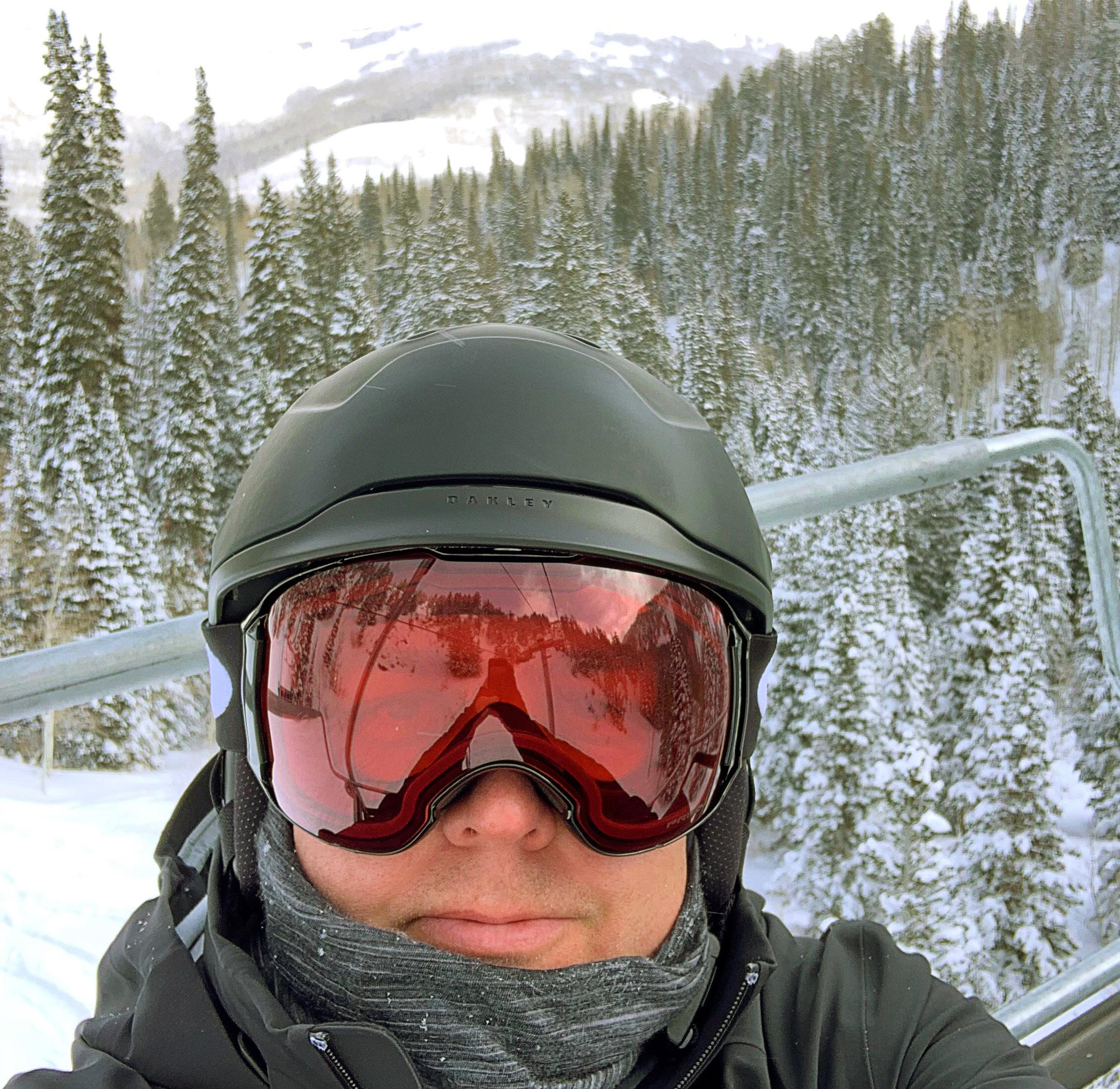
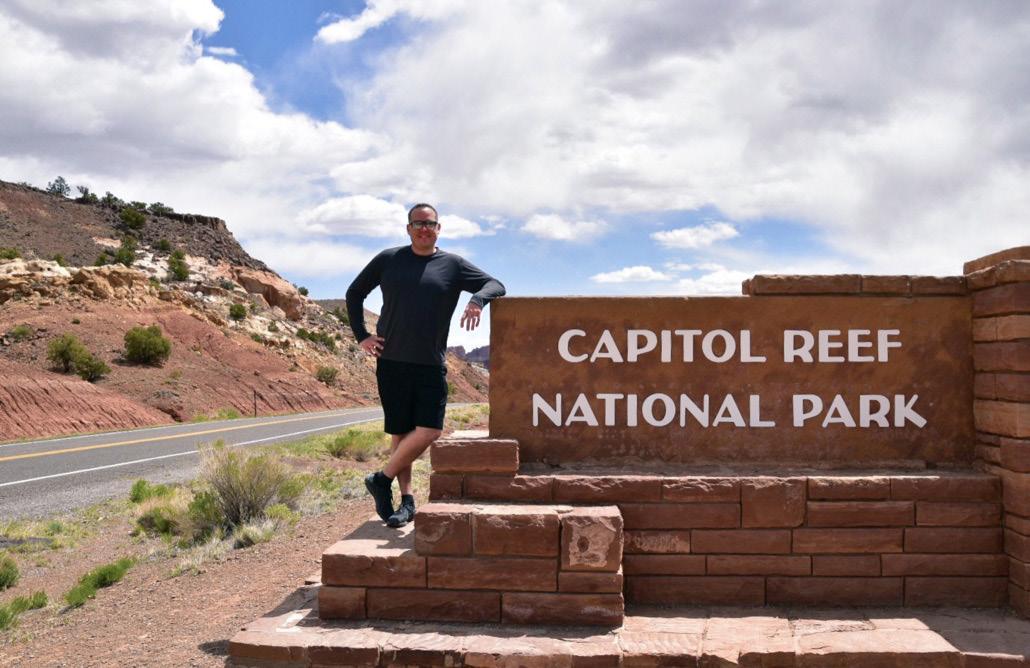
Frank hikes in Utah’s Bryce Canyon National Park.

“Almost every business class I took contributed a base knowledge necessary to run a well-balanced business. Some of the classes and projects were not real world relevant, but the understanding and history/ theory lessons were very critical to developing a well-rounded understanding of business,” he says.
“The most useful information came from professors that had experience outside academia,” he continues. “I have often spoken in classes at universities and colleges over the years, and it is evident that the professors at Concord were very competent in their skill sets.”
He says that the Marketing 101 class he had with Professor Bill Deck was a favorite of his, noting that he presented the GPS Garmin inReach Mini as his idea pitch for the class. He also lists Mr. Deck’s Quantitative Analysis as a favorite, along with Statistics, and Economics.
“Outside of the classroom I enjoyed – and continue to enjoy – snowboarding and traveling to new places,” Frank says.
He also counts hiking and visiting National Parks among his top pastimes. Considering where he currently lives, Frank is in an excellent part of the country to enjoy these activities.
“I’ve been hitting all the major ski resorts in this area,” he says ticking off Utah, Colorado, California, Alaska, and Montana as states where he has tackled the snowboarding slopes.
In Utah his National Park adventures have lead him to “The Mighty 5” – Arches, Bryce Canyon, Canyonlands, Capitol Reef and Zion.
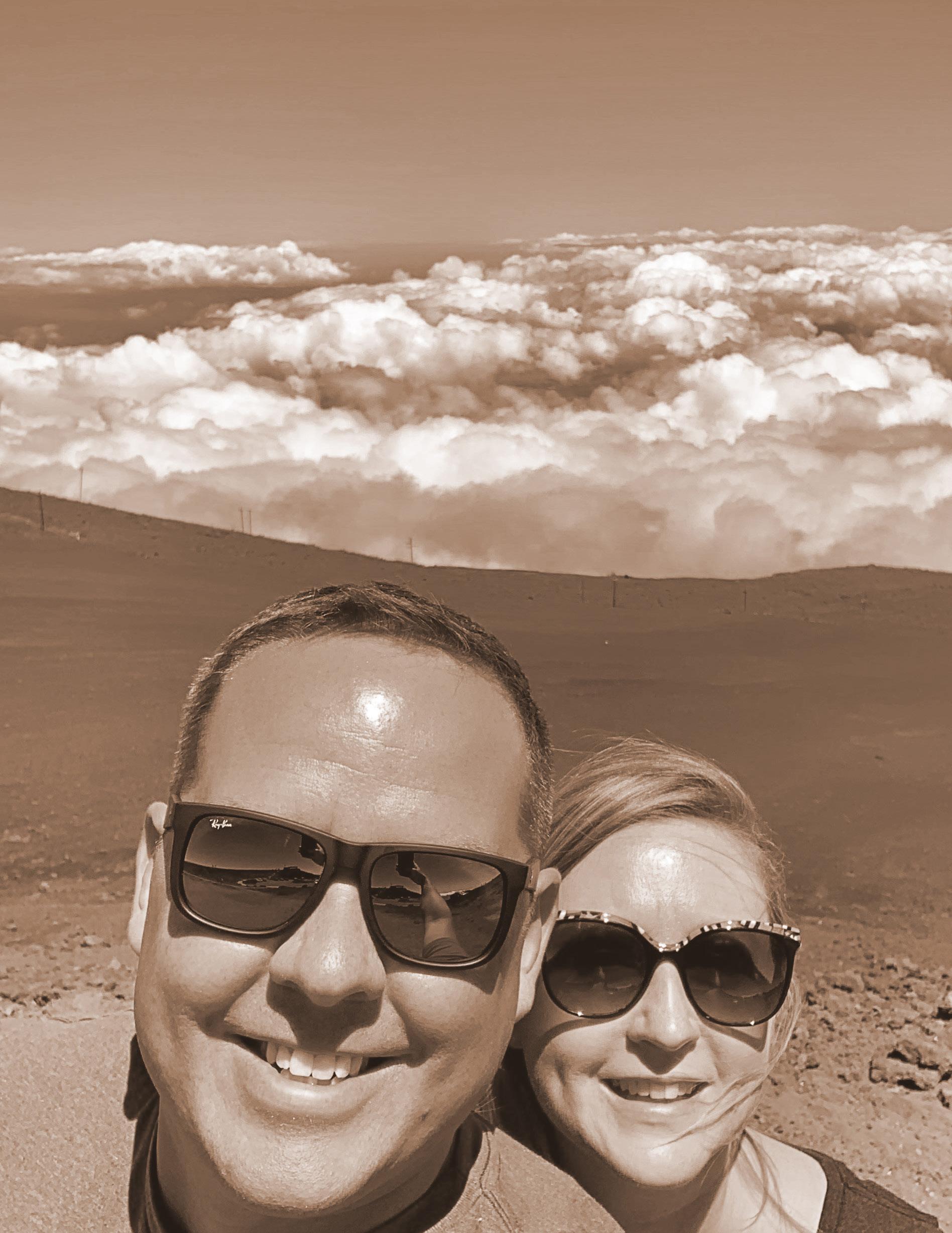
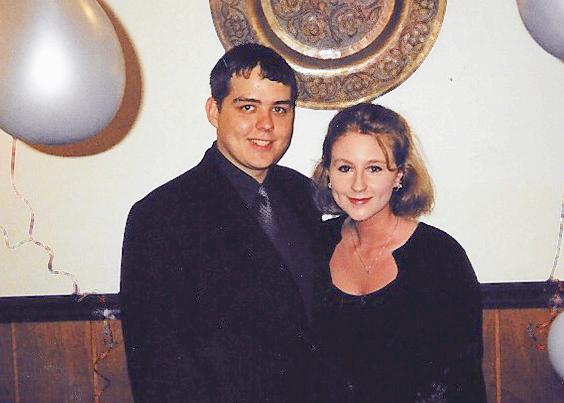
Jill and Frank attend a TKE formal.

Frank and his brother Clay at his Concord graduation.
Hiking in Haleakala National Park, Hawaii.
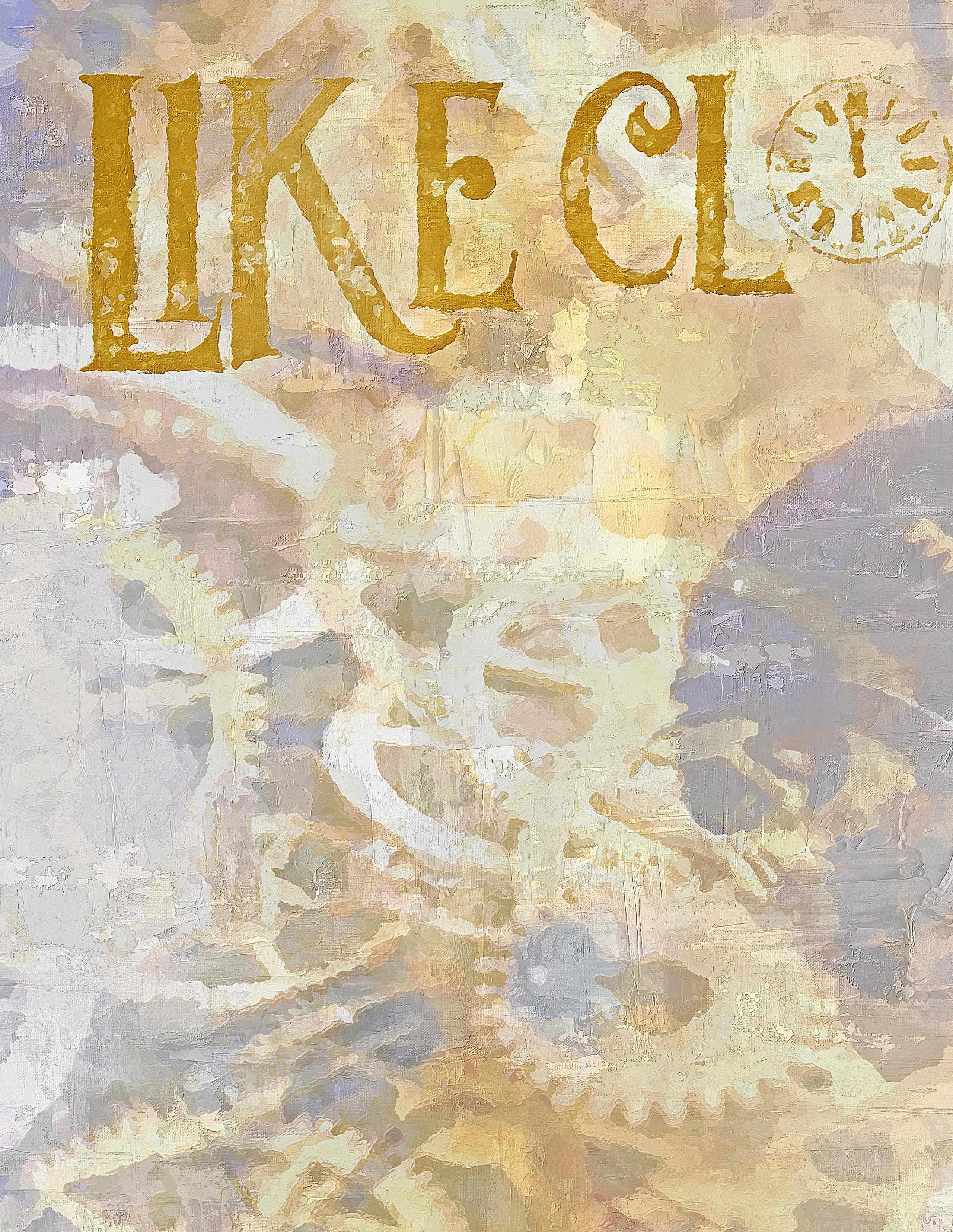





PASSION BECOMES PROFESSION FOR CLOCKMAKER GEORGE COSIER ’77
“For some reason as a kid, they just fascinated me,” George Cosier says in response to a question he frequently hears – Why the fascination with clocks?
He thinks that maybe his surroundings growing up had something to do with it.
“Working on the farm as a kid, you work on a lot of machinery,” he says.
Whatever the inspiration, George has been passionately pursuing the timepieces and their care, repair, restoration, and significance for more than half a century. He began his 52-year association with clock repair, when at 13, he had a fateful encounter with a prized family heirloom that had been tucked away for safekeeping in the attic. “My dad feared for the life of the clock, so he hid it up in the attic,” he said.
George knew that the Seth Thomas ogee that had once belonged to his great-grandfather and dated back to the 1840s was hidden there, and he was determined to get his inquisitive hands on it. He said that when he was tall enough to reach the cord and pull down the steps to the attic, he went in search of the treasure that had been in his family for generations. »

Grinding a pivot on the small lathe.
The special family clock didn’t fare so well when young George began investigating its gears, hands and other interesting parts.
“I broke some stuff on it,” he admits.
Not surprisingly, his father wasn’t pleased. He gathered up his son and the clock and took them to a clockmaker in the area intending for George to pay for the repairs.
George recalls the options Mr. Herman Dessell gave him when he evaluated the damage.
Mr. Dessell said it would cost $35 for him to fix it, or if George would work with him on the repairs, the price tag would go down to $2.50 for parts. George agreed to the latter.
He says that the venerable craftsman then handed him a piece of brass and told him to make the component needed for the repair. With this George embarked on an “unofficial apprentice program” with Mr. Dessell that lasted for several years while he was in high school.
Later in his life, George had an opportunity to train with another talented artisan. After graduating from Concord in 1977, he began working for Southern States. Following relocations through several states and positions, his employment with the company landed him in Richmond, Va. in 1983.
It was there that he crossed paths with Lawrence Edwards. “I met up with another clockmaker,” George said. “He was a true genius.”
“All the time I was working at Southern States, I was going over to his house in the evenings and on weekends,” he recalls. In addition to possessing the knowledge and skills needed
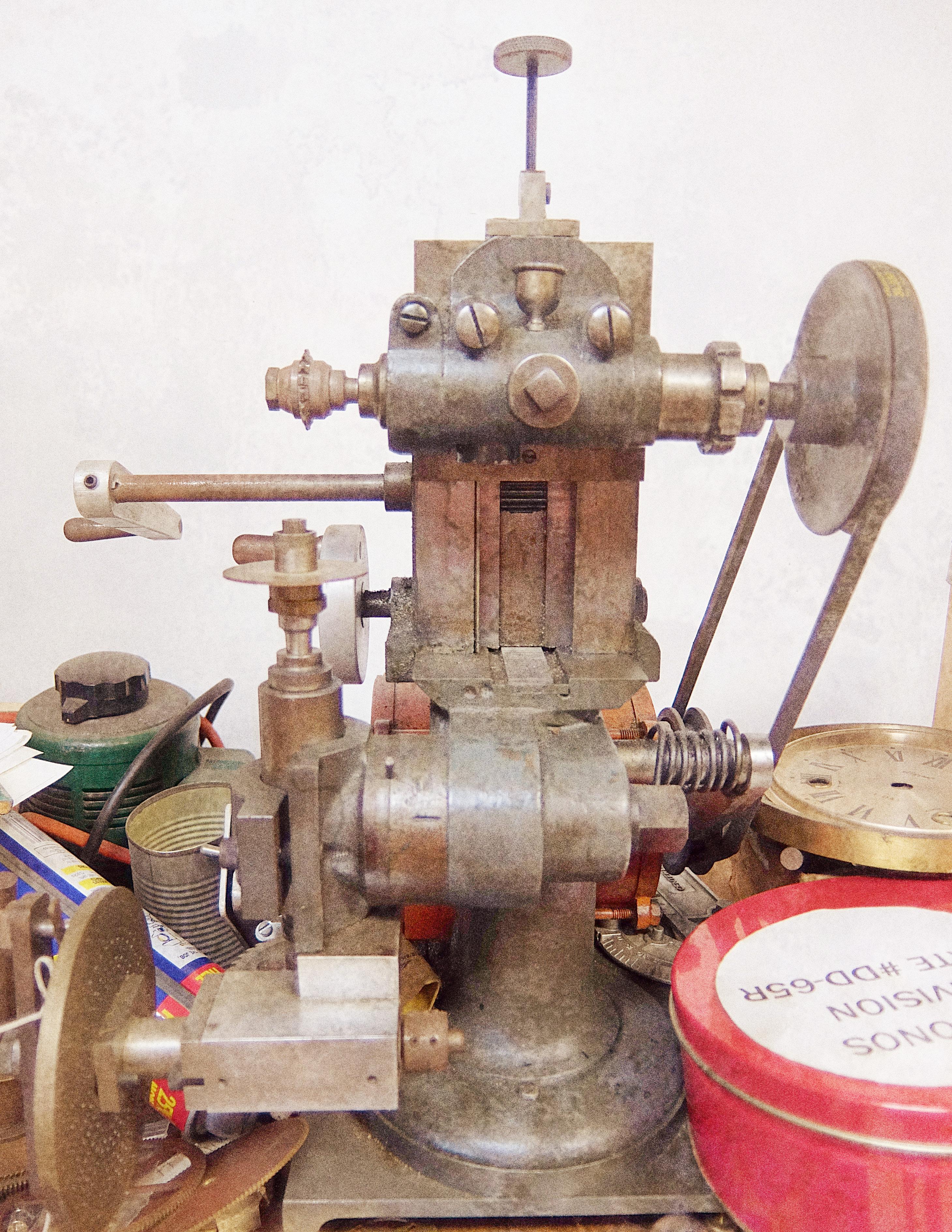


The family clock that started George on his career as a clockmaker now resides in his shop. George and a tall case bell strike made by John Payne in Lendham, England around 1740.

for clock making, George said Lawrence also had lathes and other tools of the trade. “He had the equipment,” he said.
Along with being a mentor as far as working with clocks was concerned, Lawrence would also provide George with professional advice at a critical time in his career. George remembers well the date – Nov. 14, 1991 – when he was laid off from his accounting position with Southern States. “I went to Lawrence’s the next morning,” he said.
The wise gentleman encouraged George to get his business license for a clock making enterprise of his own. He immediately followed his advice and George’s Clock Shop was born.
Utilizing a “building out back of the house” and some equipment he already had on site, George got the business up and running.
“I was basically unemployed for 24 hours,” he remembers.
With a degree in business from Concord, George has called upon his accounting skills as a small business owner. “I do my books,” he explains.
An especially memorable project for George in his career as a clockmaker has been helping care for Thomas Jefferson’s Great Clock. He was part of a select group of clockmakers who traveled to Monticello to work on the famed timepiece, among them Lawrence Edwards and David Todd, a curator from the Smithsonian.
“It’s an interesting clock,” George says.
He explained that they worked at the home of the third U.S. president after tourists had gone for the day from scaffolding that had been put up to reach the clock. »
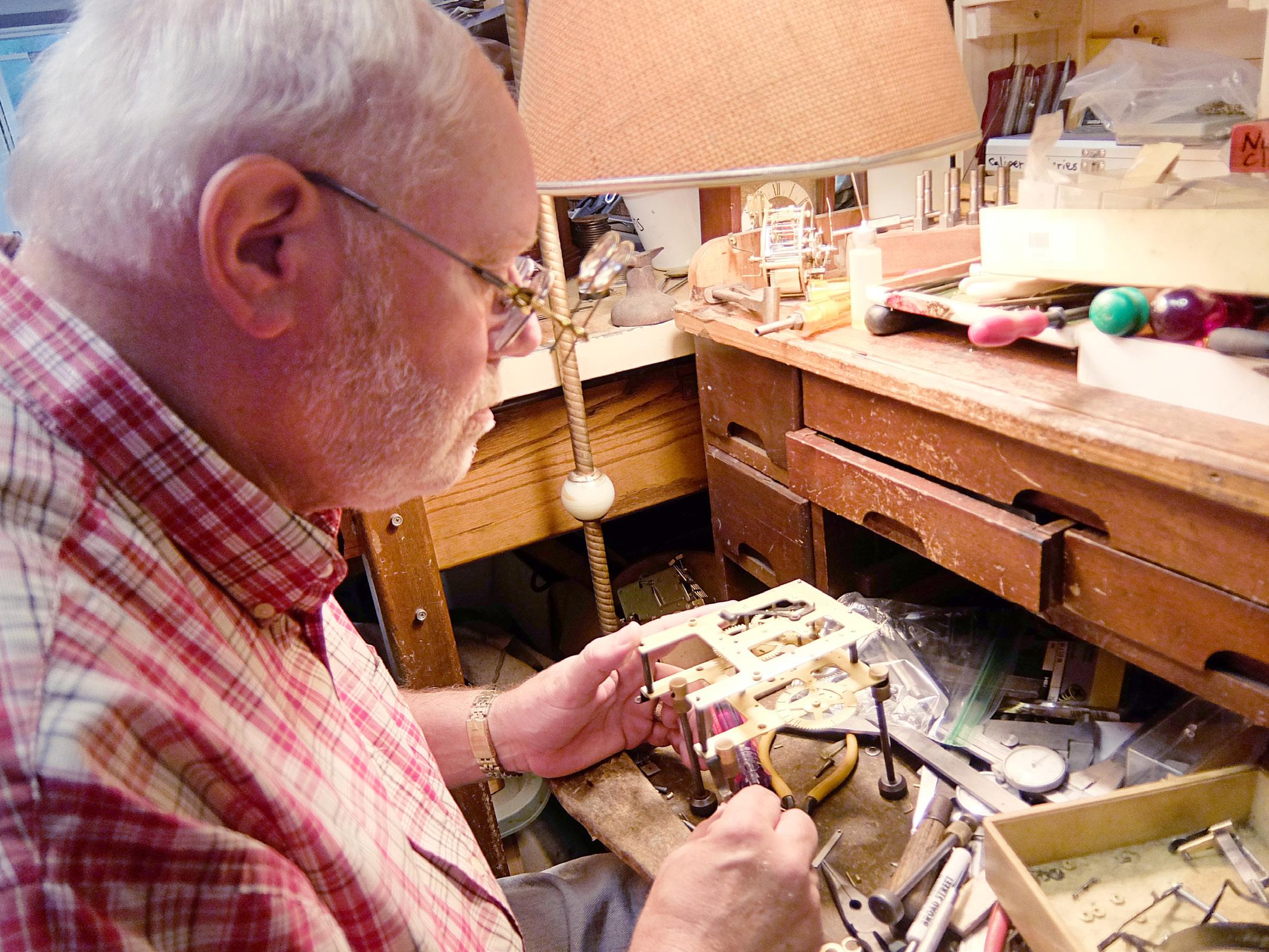
Testing an antique bell strike movement
As for his favorite kinds of clocks, George replies, “I like the antique bell strike. Most people call them grandfather clocks.”
He is especially impressed with how these clocks, dating from the late 1600s to 1850, were handmade by craftsmen without electricity or machines, taking months to complete.
“Every single one of them is different because they are all handmade,” he said.
He also counts “really fine jeweler’s regulators and weight-driven regulators” among his favorites.
A conversation with this seasoned horologist about his life as a clockmaker can lead to a philosophical discussion on the meaning of time.
“Everything revolves around time,” George says pointing out society’s ties to time zones, railroad time and military time. “People don’t understand what time did for the world.”
George belongs to the National Association of Watch and Clock Collectors and the American Watch and Clock Institute and has served as president of local chapters of these organizations.
Another of George’s passions is owning and restoring classic cars. He and a handful of his buddies “get together and restore old Mustangs” – the ’65, ’66 and ’67 variety, he says. Through the years, they have restored 15 of these ever-popular automobiles.
He goes to cruise-ins and belongs to the Oldsmobile Club of America and the Central Virginia Mustang Club. Personally, he owns three Mustangs and several Oldsmobiles.
George grew up in Pemberton, N.J., a community that he describes as “a small place that is all either blueberries or dairies.”
A high school guidance counselor pointed him to Concord. As an accounting major, he took a lot of classes taught by legendary professor Harry Finkelman. According to his calculations, he says he took 33 hours from Mr. Finkelman including accounting, business law, business math, income tax and auditing.
George got a jump start on his accounting career

News story courtesy of NBC12.
while he was still a student. He stepped in to help Concord’s Foundation with accounting and bookkeeping his last semester of college when the employee in that position passed away. He recalls that he made $2.30 an hour for his efforts.
His involvement in campus life included serving as treasurer of the Crazy Eights and vice president of the Future Business Leaders of America. His community service extended to the town of Athens as a member of the Athens Volunteer Fire Department.
Along with the books, notebooks and other belongings found in a college student’s room, George included a special timepiece. “I had a clock when I was at Concord, up on a shelf,” he recalls.
One of George’s best memories from his college days is attending the Mountain Music Festival the fall of his sophomore year.
“It was a just a great weekend,” he recalls. The event sparked his interest in playing a 5 string banjo, he says.
George also played the trumpet in the Mountain Lion Marching Band and the French horn in the concert band. He says another of his favorite memories is playing French horn for Concord’s production of the “Man of La Mancha” during spring semester when he was a sophomore.
“I had the best time doing that,” he says. “It was great.”
George has been back to campus several times since graduating and attended an alumni gathering in Richmond. He stays in contact with friends and classmates, including his best friend from college, Larry Echols. George’s sister, Sharon Cosier Swartz, is also a Concord alum.
George met his wife, Linda, who is a teacher, in Richmond. They currently live in North Chesterfield, Va. George’s family also includes two stepsons and three grandchildren.
Although he considers himself semi-retired now, George says he has plenty of work to keep George’s Clock Shop busy.

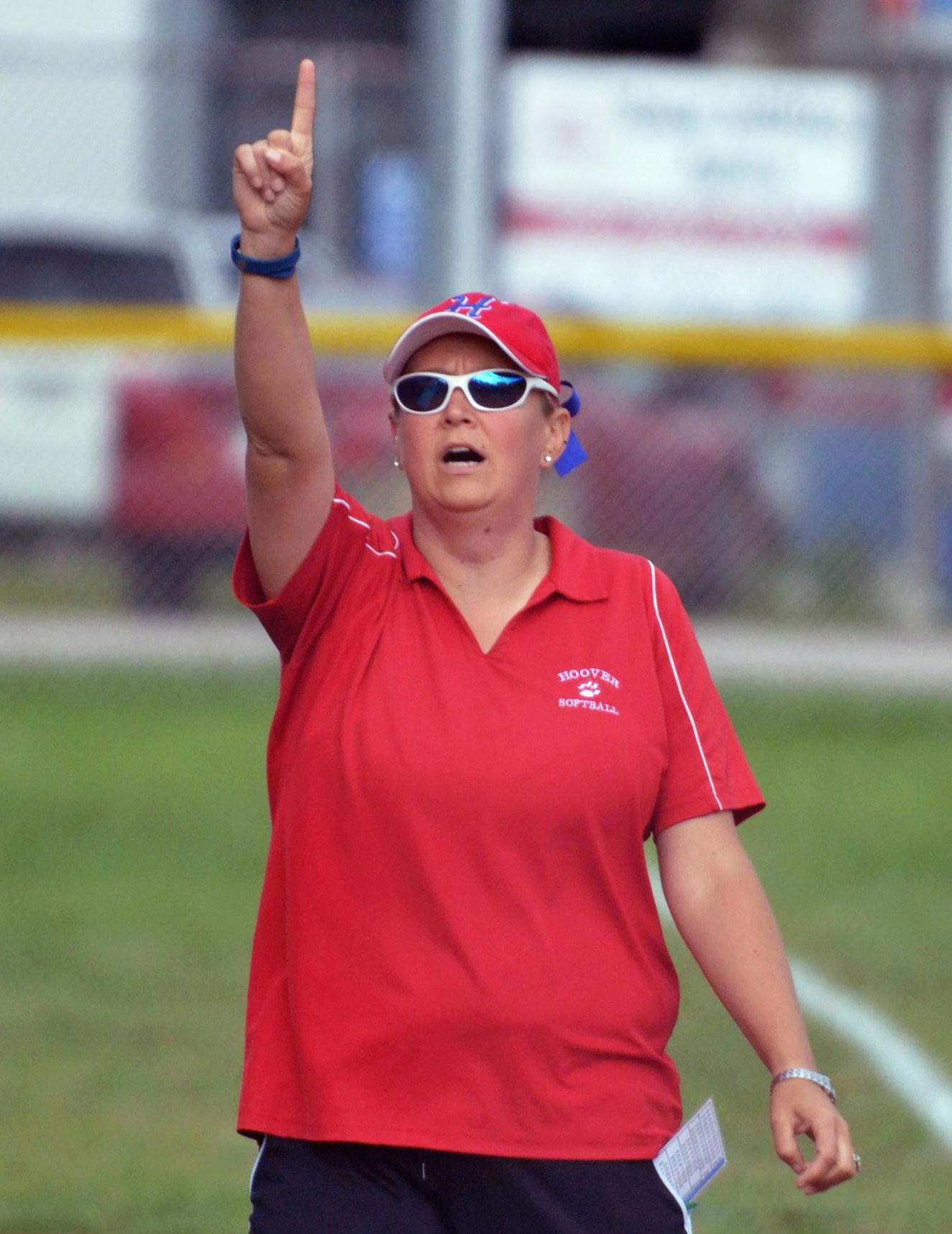
Missy Smith ’01 Receives Coach of the Year Award
Missy Anderson Smith has been honored as West Virginia’s top high school coach for an impressive career that in 2019 included state championships in the two sports she oversees. As head coach of the George Washington High School volleyball and Herbert Hoover High School softball teams, Smith is the 2020 recipient of the prestigious Van Meter Award.
Known as the High School Coach of the Year Award until 2016, The Van Meter Award is named for legendary Woodrow Wilson boys basketball and football coach Jerome Van Meter. Van Meter, who passed away in 2003 at the age of 102, won 869 total games in his dual coaching roles. Smith is only the second woman to receive the award that is voted on by the West Virginia Sports Writers Association.
With nine total state championships to her credit, Smith is accumulating an outstanding list of accolades befitting the Van Meter legacy. Since becoming head coach of volleyball at George Washington, she has led the Patriots to five state titles: 2005, 2006 (undefeated), 2012, 2015 and most recently, the 2019 trophy.
Smith’s accomplishments in softball are no less impressive. The team’s 2019 state crown was their third in a row having also made it to the top spot in 2017 and 2018 (undefeated). The Huskies were state champs in 2014 as well.
Her talent in leading the Herbert Hoover team captured an even bigger spotlight when she was named Maxpreps National Coach of the Year (COY) for softball in 2018. Her leadership in softball has also garnered the Kanawha Southern Officials Board COY in 2010 and »
2012 and the NHFS COY for 2016-2017.
Her trophy case holds a wealth of additional volleyball awards including the Kanawha Southern Officials Board COY for 2005, 2007, 2009, 2015, and 2017, the WV School Coaches Athletic Association COY for 20052006 and 2016-2017, the NHFS COY for 2012, and the Mountain State Athletic Conference COY for 2006, 2012, 2015, and 2019.
Smith describes her reaction to winning two state championships in one year and, on top of that, the Van Meter Award. “Winning a state championship is never easy,” she said referring to the nine across her coaching career, “…but being able to win two in the same calendar year was very special.”
She admits to having “so many emotions” when she received the phone call with the big news about the award. “At first, I was shocked and then humbled, when I was informed I was only the second woman to win the award,” she says. “Very quickly all turned into excitement. Any time a coach wins an award, it speaks volumes about his/ her program. No one wins awards with bad players or no support from school and community.”
Smith says the relationships she establishes with her players is an especially rewarding aspect of being a coach.
“I enjoy building relationships with my girls. The bond extends further than just the years they play for me,” she explains. “I have been lucky enough to be invited to graduations, weddings, baby showers, etc. It brings me great joy to be a small part of the successful journey that my girls make through life. I always tell them that I expect big things and they never disappoint.”
Smith comes from a family of coaches with storied achievements all their own.
“My grandfather, Lawrence Anderson, was responsible for coaching one of the first women’s softball teams in the state. My grandmother, Betty Anderson, and aunt Jean Payne, played on this team,” she explains. “My dad, Phillip (Nip) Anderson, is the interim head coach at West Virginia State University. He has coached there for several years as the assistant. Before that, he was a successful little league »

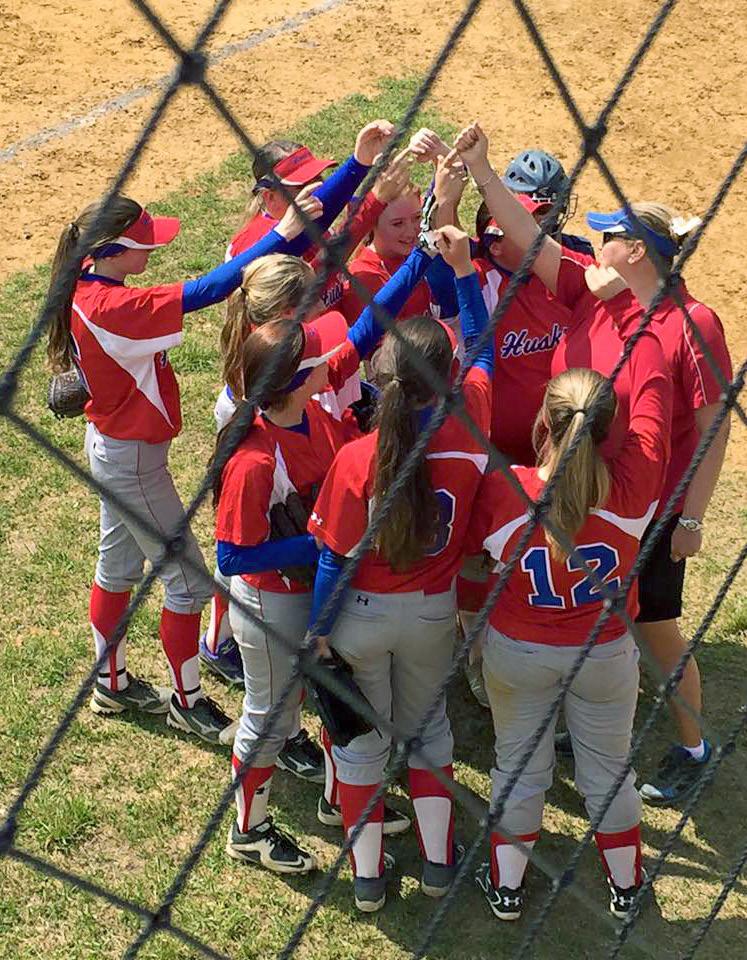
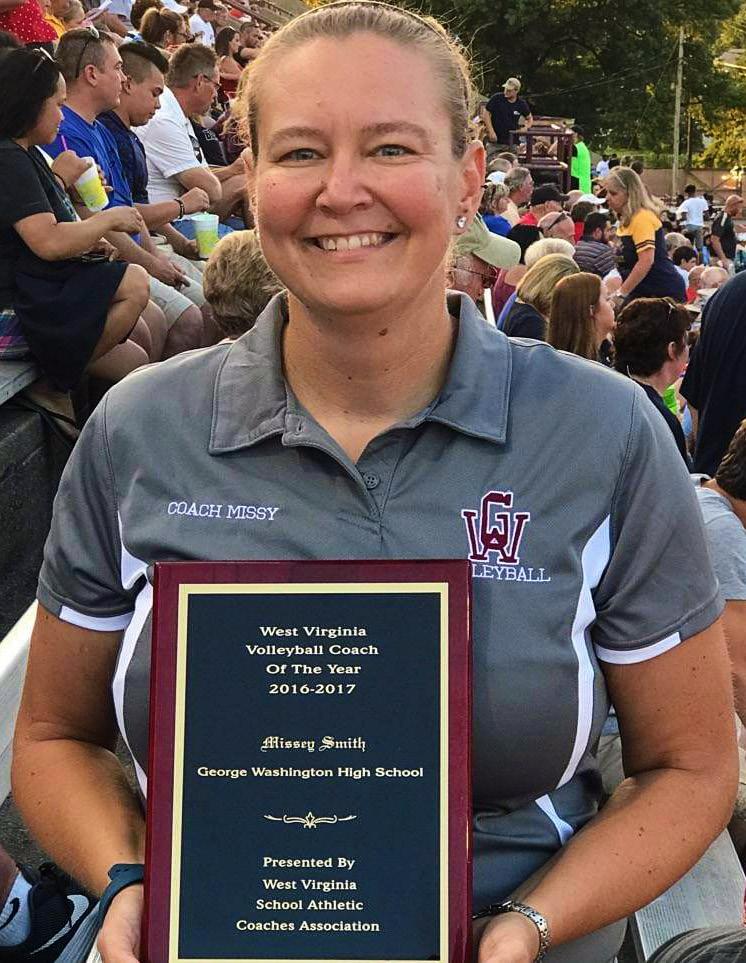


coach, taking the first team from West Virginia to the BigLeague World Series.”
Missy considers the support of her family a key component of her success. She values the insights on coaching each member brings to the group.
“My family is a huge reason for my success. They are my biggest supporters and critics. Both of which I need,” she says. “My parents, Nip and Regina Anderson, have always made sure that I had every opportunity and push I needed. My husband of 16 years, Jason Smith, is also a coach. He coaches football and teaches Civics at GWHS. Coaching requires lots of long hours and time spent away from home and I am grateful to have someone stand by me who understands what it takes to build and maintain successful programs.
“My brother, Philip (Andy) Anderson, also coaches football and teaches at GWHS,” she continues. “Having coaches in the family allows for discussions and debates that make us all look at situations differently. This helps us all be the best we can be as people and coaches.”
Missy grew up in Pinch, W.Va. and graduated from Herbert Hoover High School in 1996. She was a student-athlete at Concord, excelling as a Mountain Lion in the sports she now so expertly coaches. A 4-year starter/ letterman in volleyball and softball, Missy was named All WVIAC 1st Team for softball in 2000. She was also tapped several times as Player of the Week during her CU career.
She graduated from Concord in May 2001 with a Bachelor of Science in Education in General Science.
Along with her tireless dedication as the coach of two stellar programs, Smith is also a classroom teacher. She has taught seventh grade science at Elkview Middle School for the past 15 years. With the 2020-2021 academic year, she will be moving to Herbert Hoover to teach Biology. She currently lives in Charleston, W.Va.









